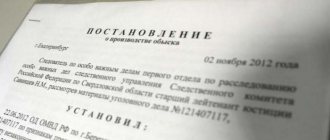The article said:
- What is judicial debt and why does it arise?
- When unpaid fines are handed over to bailiffs and how to avoid it
- Why is a paid fine handed over to the bailiffs for collection and what to do about it?
- What is an enforcement fee and in what cases can it be collected?
- How to properly pay debts on overdue traffic fines
- How to check the legal debt of a legal entity
- What consequences await the organization if the court debt is not paid on time?
What is judicial debt and why does it arise?
Legal debt of a legal entity is a debt of an organization to an individual, legal entity or state, which was transferred for collection to the Federal Bailiff Service (FSSP).
One of the most common causes of legal debt is unpaid traffic fines. Bailiffs can also transfer overdue taxes or debts of an organization to other legal entities or individuals.
The organization is given 5 days to voluntarily pay the debt from the date of receipt of the decision to initiate enforcement proceedings. You can also notify about the debt by SMS or through State Services, and then the period for voluntary payment is counted from the moment the notification is delivered. If you do not repay the debt on time, the bailiffs will forcefully collect it.
The statute of limitations for collecting money from traffic police fines is 2 years. If the period has expired and the fine has not been collected, then the enforcement proceedings end (Article 47 of the Federal Law “On Enforcement Proceedings”).
In what cases are unpaid fines handed over to bailiffs and how to prevent this?
You have 10 days to appeal the fine from the date of receipt of a copy of the resolution (Article 30.3 of the Code of Administrative Offenses of the Russian Federation). Then the resolution comes into force, and 60 days are given to pay for it (Article 32.2 of the Code of Administrative Offenses of the Russian Federation). If you do not pay the fine, the traffic police will transfer information about the debt to the FSSP.
Organizations can also impose a double fine for evasion of payment (Article 20.25 of the Code of Administrative Offenses of the Russian Federation). In some cases it can be canceled; more details in the review.
The best way to prevent forced collection is to keep track of all fines on time. You can do this online:
- On the website of departments that issue fines, for example, the State Traffic Safety Inspectorate, MADI, AMPP, Rostransnadzor. To check, you need to know the details of your cars. You will have to manually enter the STS and state number of each of them.
- On State Services, if the organization has a verified account there. We talked about how to start it in the article.
- In the Online traffic police service. It will show fines from all departments - traffic police, MADI, AMPP, Rostransnadzor, as well as regional fines for paid parking. You only need to enter your fleet data once; further checks will occur automatically. The service will notify you about new regulations in your personal account and by mail, and will also remind you that the fine has an expiring discount or payment deadline.
Check the organization's fines
The concept and principles of judicial penalties for failure to comply with a court decision
The Law “On Amendments...” of 03/08/2015 No. 42-FZ was introduced into the Civil Code of the Russian Federation (hereinafter referred to as the Civil Code) from 06/01/2015 to regulate the application of sanctions to a person who does not comply with a court decision in the form of payment of a sum of money ( often called a penalty or fine).
It is enshrined in Art. 308.3 Civil Code. From now on, the possibility of such compensation to the injured party is established by law, although in fact it could have been applied earlier, including on the basis of the resolution of the Plenum of the Supreme Arbitration Court dated April 4, 2014 No. 22 (this document became invalid as of March 24, 2016 due to the publication of the resolution of the Plenum Supreme Court of the Russian Federation dated March 24, 2016 No. 7).
Under judicial penalty on the basis of clause 1 of Art. 308.3 should be understood as a certain amount of money, which:
- recovered at the discretion of the court;
- established by the court based on the creditor’s request;
- recovered in favor of the applicant (creditor);
- meets the principles of civil law and legislation;
- does not relieve the debtor from fulfilling his obligations (established by a court decision);
- is not a basis for releasing the debtor from established liability.
ConsultantPlus experts explained in detail when and how to file an application to court to collect a legal penalty. If you do not have access to the K+ system, get a trial demo access for free.
Among the basic principles that the amount recovered as such a penalty must comply with is clause 1 of Art. 308.3 Civil Code indicates:
- principle of fairness (presence of guilty actions or inaction on the part of the creditor, absence of objective circumstances of non-fulfillment, etc.) - clause 2 of Art. 6 GK;
- the proportionality of the fine collected to the cost of the unfulfilled obligation stems, among other things, from Art. 14 GK;
- inadmissibility of the creditor receiving benefits as a consequence of the other party’s failure to comply with a judicial act - clause 4 of Art. 1 GK.
Why is a paid fine handed over to the bailiffs for collection and what to do about it?
It happens that the paid fine is handed over to the bailiffs for collection. This happens if:
The fine was paid late, the payment deadlines had already expired.
For example, deadlines often expire when paying on the last day because the bank does not have time to process the payment. The traffic police marks the fine as unpaid and transfers it to the bailiffs for collection.
In this case, it is enough to provide the bailiffs with payment documents - a receipt, payment order or bank statement. Enforcement proceedings end. But if the bailiffs have already managed to collect the debt for the paid fine, you need to contact the traffic police for a refund. Read how to return overpaid funds.
The bank transferred the money, but did not enter payment information into the government database.
All data on payments for fines is collected in the State Payment System - GIS GMP. Inspectors and bailiffs check the payment of fines using GIS GMP data. Banks are required to immediately transmit information about any government payment there.
Sometimes, due to a technical glitch, the bank does not transmit information or transmits it too late. Then the traffic police considers the fine unpaid. In this case, you need to contact the bank with a complaint and demand that the error be corrected, and provide payment documents to the bailiffs to complete the enforcement proceedings.
There was an error in the details during payment.
This is the most common reason for transferring a paid fine to the bailiffs. In this case, you will have to pay the debt for enforcement proceedings, and then return the money for the erroneous payment. To get a refund, you need to contact the department that received the money for the fine - for example, the traffic police. You can also try to adjust the payment through the bank if the money has not yet reached the recipient.
Errors usually occur due to inattention. Sometimes the accountant does not know which fields need to be filled in in the payment order. For example, when paying fines, you must fill in the “Code” field, otherwise the fine will not be paid in the GIS GMP.
To avoid mistakes, it is better to use special services for payment. For example, Online Traffic Police automatically generates completed payment orders for each fine. Fines can also be uploaded to the client bank or paid by card.
Algorithm for assigning a court fine in criminal proceedings
You can terminate a criminal case or prosecution with the imposition of payment of a court fine at any time, but only before the judge leaves the courtroom to make a final verdict.
Pre-trial investigation
Until the case materials are transferred to the court, the person conducting the investigation has the authority to make a decision on imposing a fine. If it discovers grounds for assigning a court fine to the accused, it must draw up a corresponding petition. This document must be agreed upon with the immediate supervisor of the investigator or interrogating officer. A copy of the petition must be sent to the injured party.
After preparing the petition, the investigator must send it to the judicial authority along with all the case materials and details for transferring funds. The judge studies the casework independently, without other participants.
The process must begin no later than ten days from the date of filing the application. In this case, the judge has the right:
Grant the request, but subject to the following conditions:
- The guilty person has no claims under this decision.
- The circumstances of the committed act correspond to the circumstances specified in the petition.
- There are no other grounds for terminating the proceedings.
Refuse the request. This may happen in the following cases:
- The information from the petition does not correspond to the information from the case file on the crime committed.
- The criminal case or prosecution must be closed for other reasons.
- The accused or suspect does not agree with the decision.
It is necessary to obtain consent from the guilty person, since this does not relieve him of responsibility. The final decision must always be documented in the form of a resolution.
Challenging a decision on a petition
The decision of the court based on the results of consideration of the petition can be challenged through an appeal. The suspect or accused may also appeal a negative decision in accordance with the law.
Office work in the judiciary
Article 25.1 of the Criminal Procedure Code of the Russian Federation states that it is possible to terminate a criminal case or prosecution with the imposition of payment of a court fine even at the stage of studying the paperwork in court. This means that if, during the consideration of the case materials, the judge discovers grounds for terminating the proceedings, he will independently issue a decision to close it and impose a court fine on the defendant. This means that in practice, a petition from an investigator or interrogating officer is not required here at all.
Expert opinion
Bikmaeva Elmira Fanovna
Arbitration manager with more than 10 years of experience
The judicial authority is obliged to explain what measures will follow for refusal to pay the fine. The guilty person is also obliged to hand over to the bailiff a payment document confirming payment of the sanction.
Another option for imposing a court fine
According to the legislative acts of the Russian Federation, before writing a petition, the investigator or inquiry officer is obliged to establish the circumstances on the basis of which there is a need to terminate the criminal case or prosecution. The judicial authority, having received such a petition, is also obliged to identify such circumstances. And only then should the judge make a final decision on imposing a penalty.
There are situations when it is not necessary to draw up a petition, and the issue of imposing a fine is not resolved. There is a solution here:
- For some reason, the investigator, inquiry officer or court authorities did not establish the grounds for raising the issue of imposing a court fine. In this case, there is a need to require additional investigations and the inclusion of documents to confirm the existence of these grounds. They may be different in each individual situation.
- The investigator, inquiry officer or court authorities have established the grounds for terminating the proceedings, but due to various circumstances they do not consider the option of imposing a judicial fine on the guilty person. Then the accused, suspect or his defenders can prepare a corresponding petition with a request to impose this penalty. This document is not mandatory for making a final decision. However, it may push authorized persons towards it.
A petition to terminate a criminal case with the imposition of a court fine can be
You can find out about the imposition of a court fine during legal proceedings here
Application, examination and challenge of decisions on petitions
The above requests are required to be considered. The results of the study must be documented in the form of a resolution. It is necessary to indicate the motivational part for a particular decision.
The maximum period for adopting a resolution should not exceed three days.
The decision can be legally challenged:
- Resolution at the request of the investigator - to higher management, the prosecutor or to the court. The decision of the investigator is to the prosecutor or to the court.
- The court's decision is challenged on appeal with a mandatory decision on the case.
What is an enforcement fee and in what cases can it be collected?
After the initiation of enforcement proceedings, the bailiffs have the right to withhold an enforcement fee from the debtor. Its amount is:
- for individuals - 7% of the fine amount, but not less than 1,000 rubles;
- for legal entities - 7% of the fine amount, but not less than 10,000 rubles.
The enforcement fee is an additional penalty in favor of the FSSP; it is not deducted from the total amount of debt. That is, if an organization does not pay its debt voluntarily, even for a small fine of 250 rubles you will have to pay another 10 thousand.
Reasons for use
A person may be released from criminal liability in the following cases:
- Committing a minor or moderate crime for the first time in life.
- It compensated for the damage caused for the commission of the crime.
If a person has committed several crimes of minor or moderate gravity for the first time, then this is not a reason to bring him to criminal responsibility. Here it is likely that a court fine will be awarded.
Citizens who have committed a crime for the first time include those whose criminal records have been expunged or expunged.
Compensation for damage refers to the adoption of various measures to make amends for the guilt of the person who committed the crime. This could be monetary compensation for the harm caused, an apology, or other assistance that will be sent to the victim for his recovery.
It is worth noting that promises regarding compensation for damage suffered do not relieve the guilty person from criminal liability in the future.
How to properly pay debts on overdue traffic fines
It all depends on whether the bailiffs managed to initiate enforcement proceedings against the organization.
Previously, even after transferring the fine to the bailiffs, it was possible to pay the decision using the details of the traffic police. The rules have changed since 2022:
- If the fine is overdue, but there is no enforcement proceedings yet, you need to pay the fine itself.
- If enforcement proceedings have already been initiated, it must be paid according to the details specified in the FSSP resolution. Once the court debt is paid, the fine debt will be removed automatically.
As a rule, the organization only has a resolution from the traffic police, and the details of the bailiffs are unknown. This problem can be solved with the help of automatic control of legal entity fines. The Online Traffic Police service checks every day whether the fine has been handed over to the bailiffs for collection. If submitted, the service will show the payment details to the FSSP and automatically generate the correct payment invoice.
Appealing an administrative fine - deadlines
After receiving a ruling on an administrative violation in your hands, regardless of whether you received the ruling in person or whether it was received by mail, you must count 10 calendar days from the date of receipt of the ruling. The 11th day is the day the decision on an administrative offense comes into force. These 10 days are given to you so that you can appeal the received decision in court or with a higher official.
If you decide to appeal the decision, but it has already entered into force (i.e. more than 10 days have passed from the date of receipt of the decision), you need to restore the deadlines for appealing the decision through the court.
How to check and pay legal debt of a legal entity
There are three ways to check your debt:
- On the FSSP website.
Go to the “Data Bank of Enforcement Proceedings” section and mark that you want to check the debt of the legal entity. Enter the name of the organization and address with zip code and click “Find”.
The site will show all the organization’s debts to the bailiffs. If there is a debt, you can immediately pay it by card. Payment from a current account is not provided, but you can make a bank transfer using the details specified in the resolution on initiating enforcement proceedings.
- On State Services.
The organization must have an account on the portal. It can only be created by the manager or his representative with the right to act without a power of attorney. If you have an account, you can request information in the “Judgment Debt” section. Debts can be paid by card or electronic money.
- On the portal Onlinegibdd.ru.
Any employee of the organization can create an account in the Online State Traffic Safety Inspectorate. The service will show the legal debts of the company, its branches and divisions. In addition, it will be clear what fine the court debt was issued for. The service will notify you of each new debt by mail and in your personal account.
You can pay for enforcement proceedings on the Online State Traffic Safety Inspectorate either from a bank card or from the organization’s current account. To pay from a current account, the service will generate payment slips.
Check the company's legal debt and fines
What consequences await the organization if the court debt is not paid on time?
In case of forced collection, bailiffs can:
- Write off money from the organization's accounts, taking into account the performance fee.
- Seize the organization's current accounts if there are not enough funds to write off the debt. As soon as the required amount appears in the account, it will immediately be written off against the debt.
- Place restrictions on the company's property. In particular, bailiffs can impose registration restrictions on a company's vehicle fleet. Not a single car can be re-registered or deregistered. Seizure of property is possible if the amount of debt in enforcement proceedings is above 3,000 rubles.
Restrictions on the organization’s accounts and property will not be lifted until the debt is paid. The arrest must be lifted within 3 days after the decision to end the enforcement proceedings is made. If this does not happen, the debtor can contact the bailiff personally.
Bailiffs' decisions to lift restrictions do not immediately reach the traffic police. The organization has to contact the FSSP for a copy of the document on the completion of enforcement proceedings, and then personally provide it to the traffic police. Therefore, it is easier and faster to pay off debts voluntarily or avoid them.
Checking fines and legal debts of an organization
Check for free








